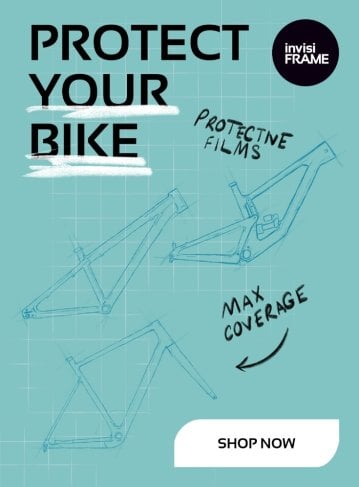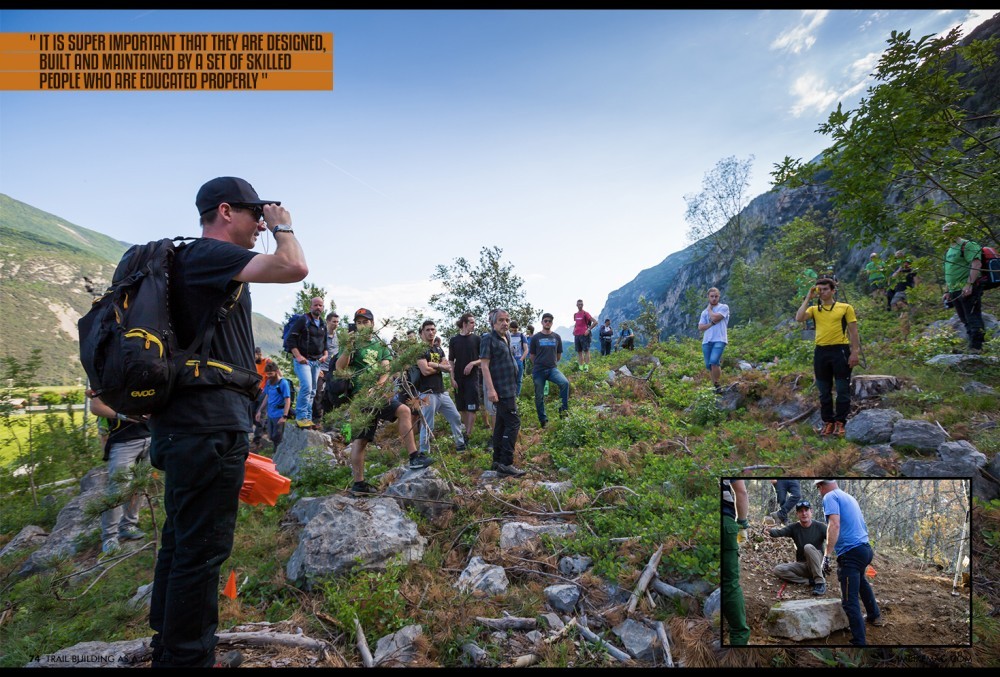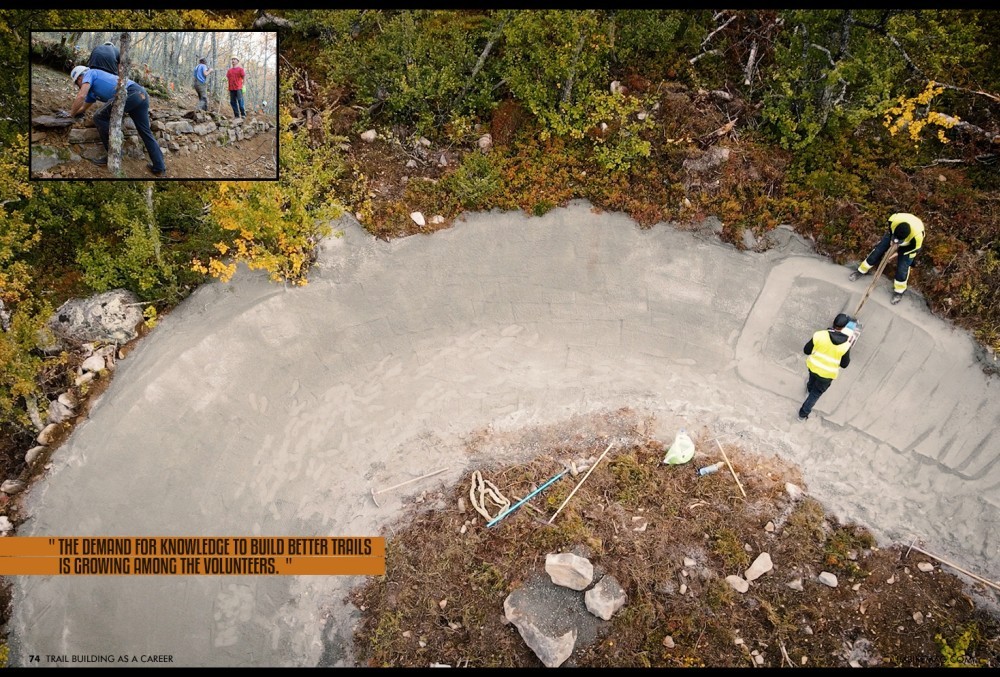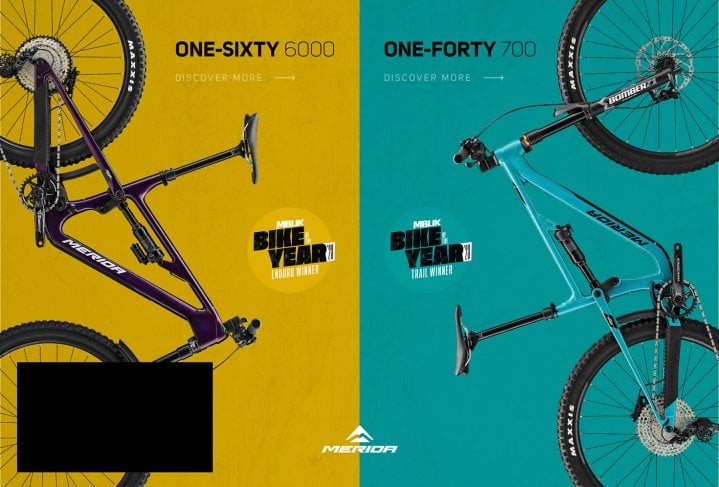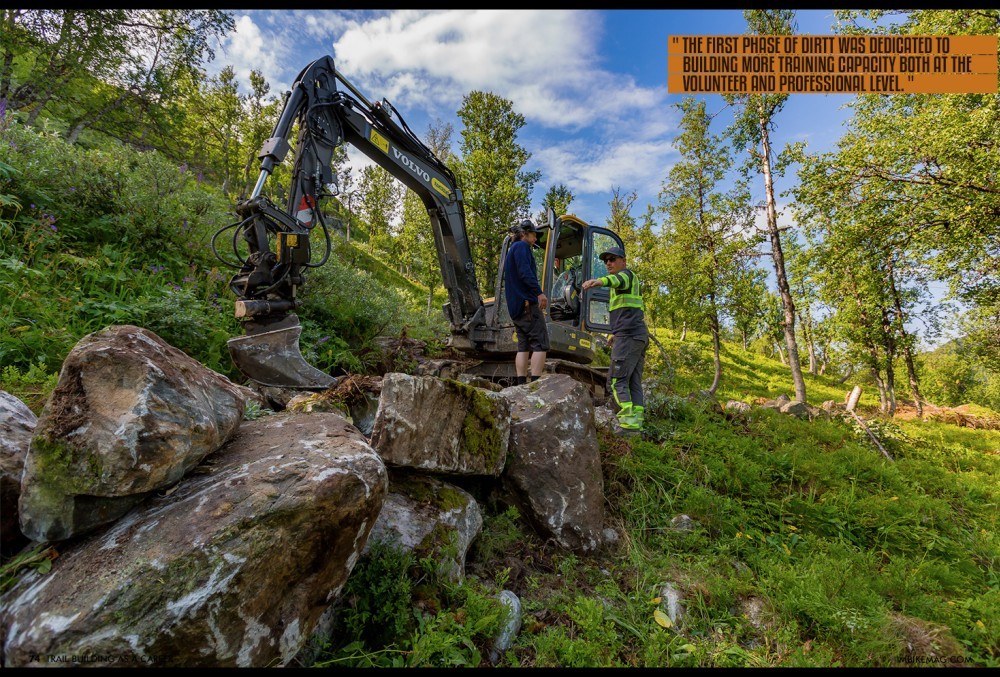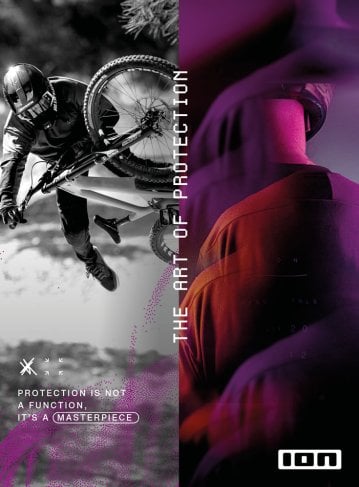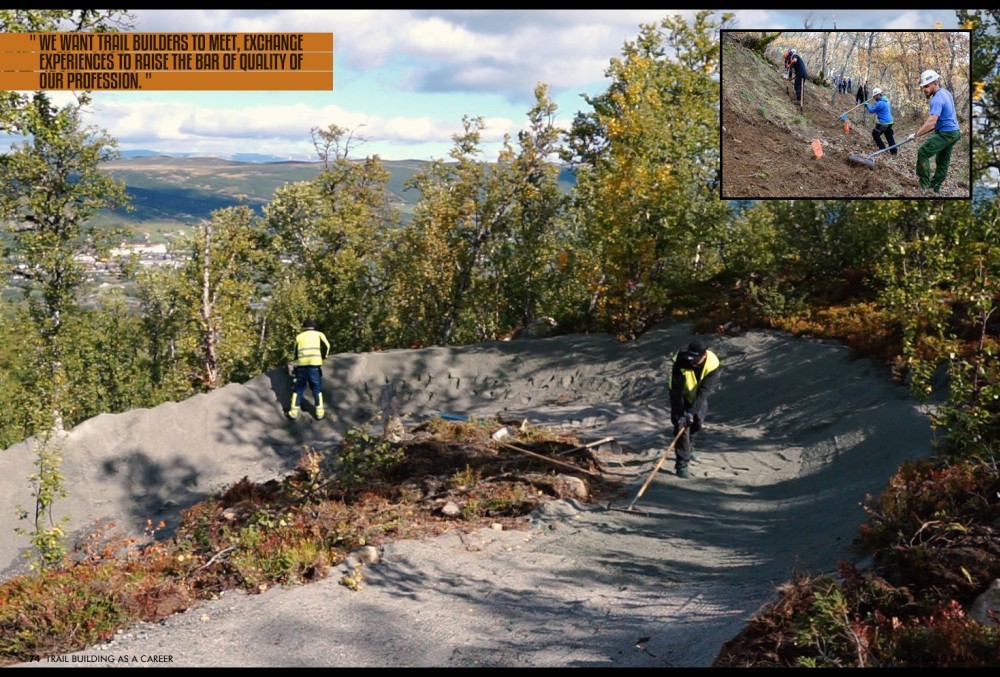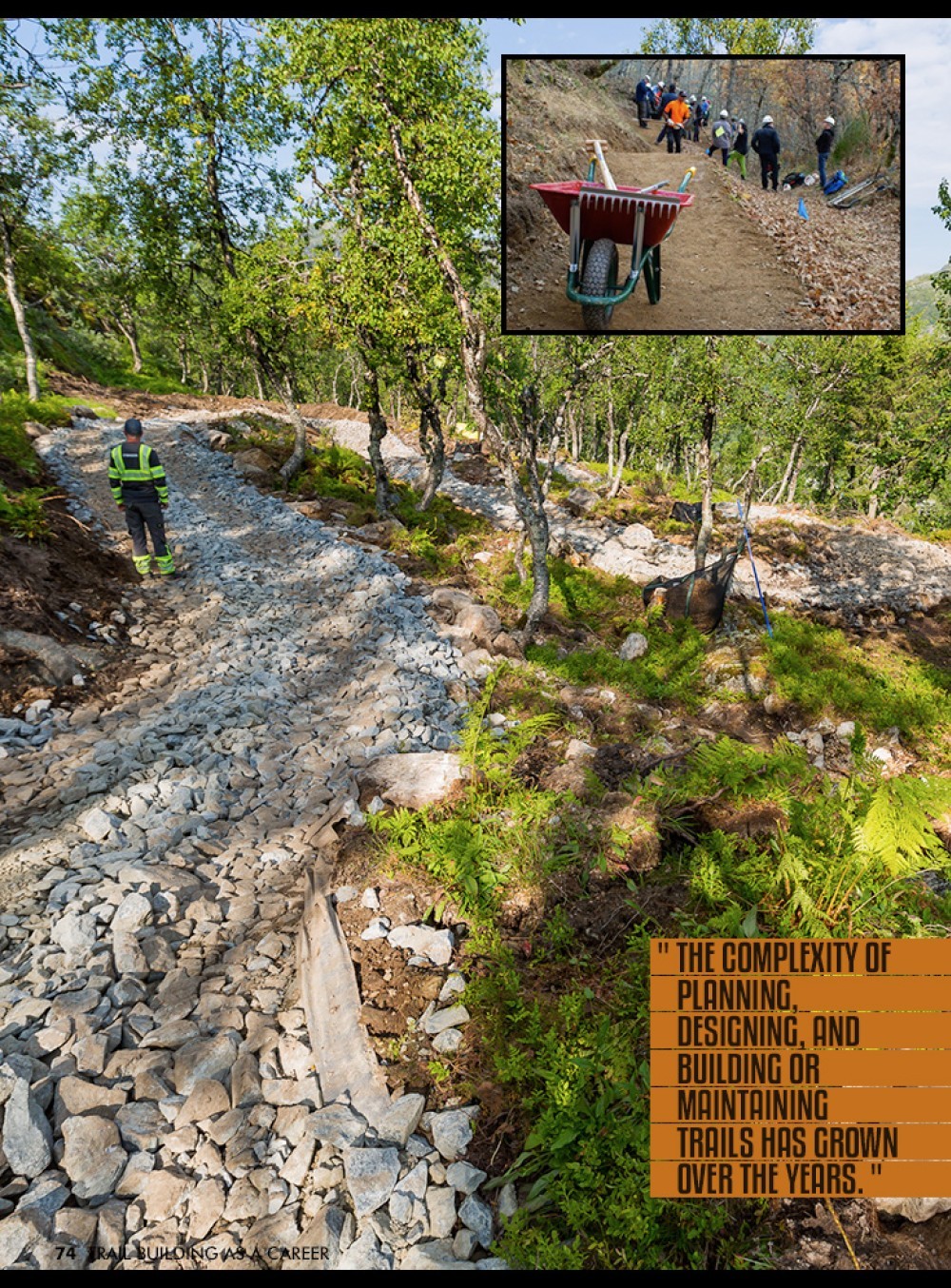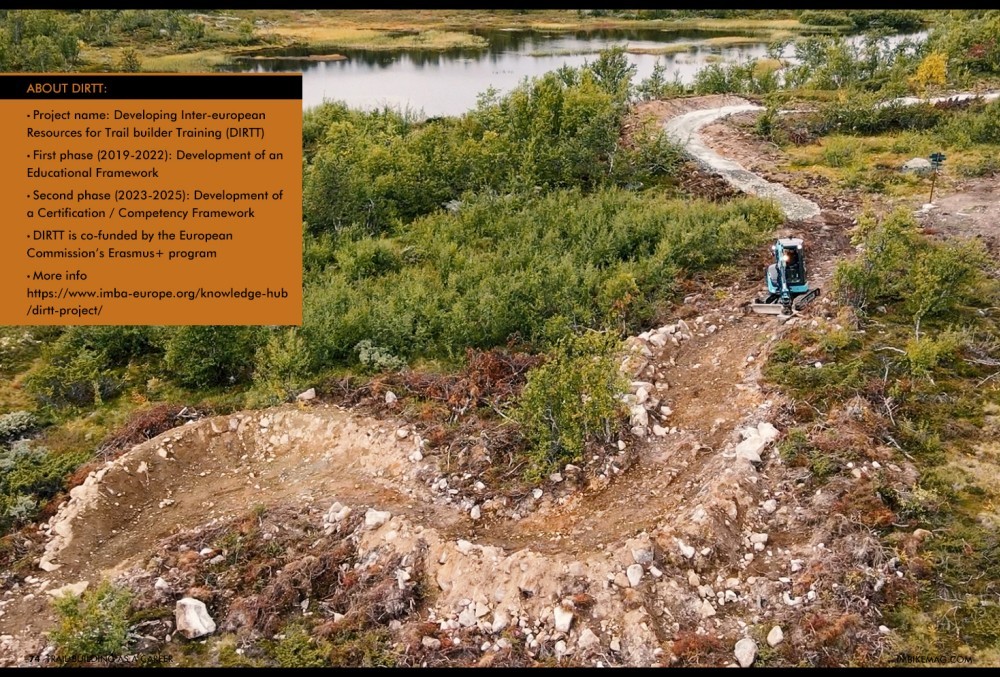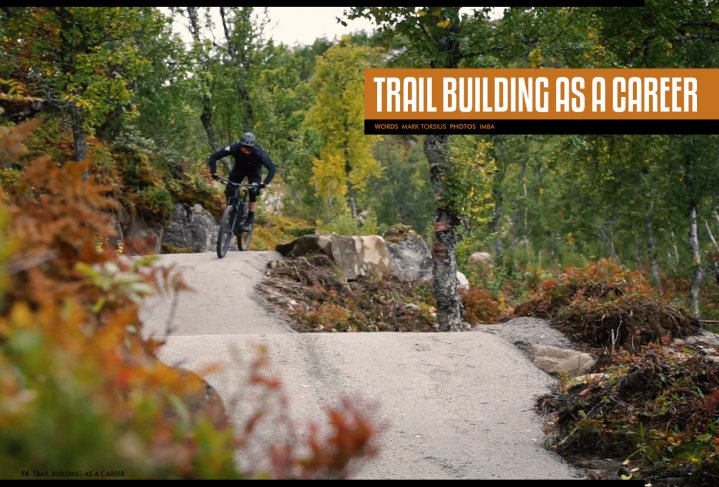
Trail Building as a Career
Issue 74 / Mon 20th Mar, 2023
Looking for a career? Trail Building might be the job for you!
The popularity of mountain biking is booming, with record amounts of bikes sold in the past half a decade it is obvious the need for proper mountain bike trails is growing just as rapidly. To create this new infrastructure, it is super important that they are designed, built and maintained by a set of skilled people who are educated properly in order to have a sustainable trail infrastructure all across Europe.
This need was what put the DIRTT (Developing Inter European Resources for Trail builder Training) project in motion back in 2019. Started by IMBA Europe and an international project group representing both volunteer and professional trail builders, education providers, municipalities, and tourist destinations. This project was aimed at creating a professional toolset for trail design, construction and maintenance.
In the first project phase DIRTT developed a mountain bike trail educational framework and study programme, leading to Europe’s first formal education for Mountain Bike Trail Planning, Construction and Maintenance at Fagskolen I Viken in Norway. The program was launched in September 2022 in Geilo, with a total of 25 students from 12 different countries.
But it’s not only a training offer that has been created for professionals. Specific training programmes for volunteers are also on its way in Denmark and Scotland. Depending on the maturity of the MTB market and scene, a bespoke training offer can be developed based on DIRTT training resources provided one has experienced, competent tutors. New to the DIRTT Educational Framework is the distinction by different build levels (from ‘rake and ride’ to hand built, machine built and engineered trails) and the consideration of rider dynamics when designing new trails.
Christoffer Riis Svendsen, trail expert and project manager of the On Trail project in Denmark, explains how the DIRTT training resources cascade into training programs for volunteers.
“We have benefitted from the DIRTT project with a much more broad and specialized updated knowledge on mountain biking as a recreational activity and trail building as a profession. Within that spectrum we got the opportunity to develop and design a Trail Keeper and Trail Boss training course for volunteers and specific workshops to step up the quality of the purpose-built mountain bike Trails in Denmark. Moreover, we also address topics like legislation, cooperation with landowners and how to manage dig days for volunteers”.
The growth of mountain biking also translates to the number of people interested in becoming a (volunteer) trail builder. “There is a solid interest in being a volunteer trail builder in Denmark. And the demand for knowledge to build better trails is growing among the volunteers. Almost all trails in Denmark have been, or are, built by volunteers. And the few small companies who build trails, often do it with some sort of cooperation with the volunteer groups. Over the years the knowledge about trail building among volunteers has increased. Governmental agencies, municipalities and land managers have had some issues and found it sometimes difficult to accept that ‘some volunteer’ came and knew much more about how to build good sustainable trails in our nature. But they have overcome, and now do appreciate and embrace the special knowledge and skills among many volunteers”, as Christoffer explains.
Thanks to the renewed support from the European Commission, DIRTT will be able to continue developing the existing framework into a European-wide trail builder certification program.
Building capacity, distinguishing quality
In a comprehensive trail building sector survey undertaken by the DIRTT project in 2020, as many as 65% responded that they struggle to recruit employees with the appropriate skills and competence. Furthermore, 56% of the sector experience that there is not enough training available to meet the needs of their organization. Hence, the first phase of DIRTT was dedicated to building more training capacity both at the volunteer and professional level. Another central finding in the 2020-survey was a strong demand for a non-mandatory certification program. As many as 79% of the respondents felt that the introduction of certification would lead to an increase in the quality and sustainability of mountain bike trails.
With a growing body of quality assured educational resources, and DIRTT-related training and education programs starting to form around Europe, the international certification program was a natural next step for DIRTT. Work on the certification will commence January 2023, leading up to a planned 2025/2026 certification launch coordinated by IMBA Europe.
Sylvain Häderli, environmental engineer at BikePlan as well as being responsible for the MTB trails in Verbier, has a clear idea about the future development of the trail building sector.
“Our generation is in transition from amateur trail builders, doing it for passion and most of all for themselves and professional ones that build trails according to users needs, land constraints, budget and with a long-term vision. With DIRTT we first wanted to give the new trail builders technical content to improve the quality of their work but that's not all. We aim to improve trail builder’s understanding of the public they build for, the land they build on and the process to deliver a successful project. We want trail builders to meet, exchange experiences to raise the bar of quality of our profession. It’s great as well to have a pool of experts that can help all these new companies to start with the right standards of quality and prices that are coherent. Certification will help clients identify these companies that deliver quality, and it will justify their prices”
A move towards stronger job recognition
What will a certification framework mean for trail builders? Firstly, the planned certification framework for mountain bike trail building will be a standard for the competences needed in the sector, serving as a much-needed yardstick for quality assurance of the skills and knowledge held by professionals in the sector. Secondly, a certification framework will add a stronger degree of formal job recognition to the craft of trail building across Europe.
“We realize that maintaining the status quo might feel like the most convenient alternative for some. Yet, with the massive growth in trail building also comes increased responsibility. The certification project is a golden opportunity for the sector to shape the profile and position of professional trail building in the future.” – Lars W. Jensen, DIRTT Project Manager
It’s clear that the sector has a big responsibility due to the increased participation in outdoor recreation, new user trends, increased awareness of sustainability, climate change and loss of biodiversity. The complexity of planning, designing, and building or maintaining trails has grown over the years. Whether it's landowners, National Park managers, resorts, or municipalities, the conditions they place on trail builders or trail maintenance crews have become stricter as well.
“I think today we plan a lot more than back in the days. It is about sustainability, lack of spaces, project costs/time, maintenance costs. The concern about users' safety is growing as well. Trails need to be predictable, according to their trail grading level. It is not only adrenaline junkies riding trails anymore, the mainstream public have other needs in terms of security. Safety regulations within companies and workplaces are getting stricter and stricter as well. It’s very different from one country to another but all in all there is less and less space for amateurism. I think a company doing cheap work would not last very long nowadays but still they can have a very bad impact on the environment and how the public and stakeholders perceive mountain biking”, says Silvain Häderli.
“There’s still a lot of work to do and more collaboration with trail builders, trail associations, land management agencies and other stakeholders will be essential to future proof this sector”, says Mark Torsius of IMBA Europe. “What we certainly don't want to do is take away the creativity and, to some extent, the romance around the 'craft' of trail builders. Nobody would like to see or ride trails that are all the same. But we do want to make sure that we construct and maintain trails in a way that we minimize the impact on the natural environment or try to strengthen the recreational carrying capacity or by better planning and design. It’s about the right trail in the right place, and that also means it's better not to build a trail in some places. With the DIRTT educational and future certification framework, we expect more and more trail builders to make the right trade-offs when developing new trails or making existing trails more sustainable’
About DIRTT:
Project name: Developing Inter-european Resources for Trail builder Training (DIRTT)
First phase (2019-2022): Development of an Educational Framework
Second phase (2023-2025): Development of a Certification / Competency Framework
DIRTT is co-funded by the European Commission’s Erasmus+ program
More info https://www.imba-europe.org/knowledge-hub/dirtt-project/
By IMB


